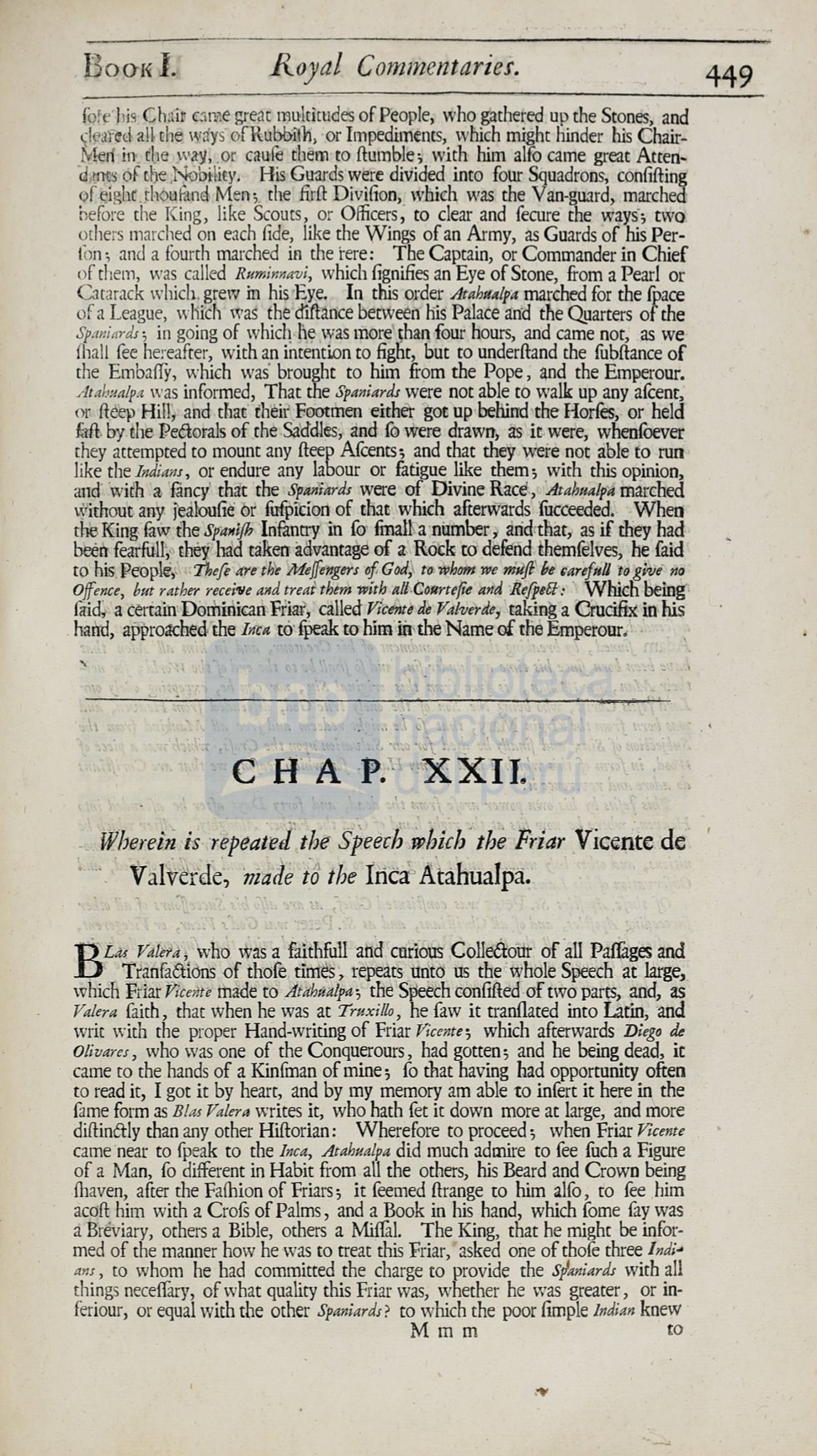

.Boo-rft
Royal
Commentariú.
foí·e'}1,is
Cbif
<r:i.rnie
gre_¡¡r nwlrlrn~es of People, who g'athered up the Stones, and
<;ktafl!:Q~-al-l frh~
\.l.-.áys'
0ffití
1
~i'A1,
·fü
Impedilntms, wFüch might hinder
lií.isChair–
_M(;;lrl
i-n~
éb1G
)N~'};
_or cacu,fu
rhérn·to
íl:mnble y_with
hirn
alfo carne great Atterl,
i:i1Qfl;1í,~
of ~be ;l-Jobi<h~y. ·His Gaa.rtls wéfe div.i.ded int© four SquadFofils-, cenfifüng
of.~ígmql~©l!l~n4Mefrt;. the
fü;B:
DivifioA,
w.liiid:i_
was.the Van-guard, mar.ched
hefore che King, like Scoucs, or Officers; to clear and fecure· the w,¡ys·; twci
others marched on each ftde, like che Wings of an Army,
as
Guards of
bis
Per–
fon; and a fourth marched in the rere: The Captain, or Commander
in
Chief
of them, was called
Ruminnavi,
which ftgnifies an Eye of Stone, from a Pearl o¡:–
Cararack which.grew
m
his ·Eie.
In
this o,i:der
Atah«alpff
manrhed for the [pace
ofa League, wfüd1 was' the'dí'trnnte becweéñ his f>alace ancl che Quarters of rhe
Spanúrrds;
in going of whicq-l\(¡ ,yas 1ñ0r~\\haq f©ur hours, an'd carne nor;
as
we·
íhall fee heeafcer, with an
intenci.onto
fight, l;
>i.itto underíl:and the fubíl:ance of
che Embaffy, which was· btought to him fr9m the Pope; 4nd che Emperour.
Atakiualpa
was informed, That the
Spaniards
were notable
to
walk up any_áfcenr,
Ott
f.t_eep
fü¡;J:~
and.dian tMir,Eootmefil eithé\' gotl up,beliirrd·t!he
1-forfes,
0r
held
fJ!fi,
by.füe-P€lli1DraJs
of
_cbe
.S¡i!ddl&s;,
ano
fo
were dráwn-, ~ ·
it-
wer.'e,
woonfoever
chey attempted
to
mount any íl:eep Afcencs; and that
th@y
\v.€i.:e not
·atite
to
run
like the
Indians,
or endure any labour or fatigue like them; wirh this opinion,
ami'
'.wi~
:a 'fancv'
t:hirt
'the
Spiin,~rds
were
0f
I)ivine
R:a~e':,
AtabffalJM
má1íd1ed
~'lithou'~
an.~
fea.koufüi
~r
fufpí.tiG)n 0f
.fllrían,,which
afterwards' füccecidedi- When
thb
f{.,,jrrg,faw,;rhe
SfaHifb
fafanrry'
ih
f@
fuialta
;Ai!l'mber,~
aliidrtlilar.,,
as
if
ili-ey
had:
b~é0<
fearfuílt~
~hé:sNmd
·tálíerr--aivanrage of
i ,
Róck
cd
deféñd,nhemfü1ves~'
1'ie
faid
to'fui.s,Feúp:l~ú·1, Tt,efe
l(J'e-t½'e
'Me.ffmgers ·of, 6Jod-,\ t~ffihain we
m,eft
1
be
l!arqli/J
·irJg{vl
no
0/fence, but rather recei'lle and treaf
them
-with,a!MoRrtefie
nn"4,
·
B.ef,p116f-., '
W'l:rid:i
~eing'·
faidi a c(lrtain\
DorMRi<raIB
Fi!im\ di-lled
Vrctilti db·Falverde1
'.takin~ a
tJrocmx-
in•
his
.haml,
approat:}ire'd.~the
Jnta
··tó'-f~ak-ttrhim.iit-theMhneef
die
Emper0ur)- .·
•
•
'' ";'p
~ ~
' '. .')\'\\\
;,t
'
4,J:
' \
l
'\
·
...
\
"t\
21 :
...
'-\
,.•' \,,¡"
\~,t
t' • "\
-. \ •
~
!
•'
j •
>
'\''.1) ,,~\
~
-. '
~I /', ~\ ~,
•
/-
,
e a·A"'
J>/ ¡
'!)(X:Xl'l'\--..
~
,
.
'
\
~.
'
,_
\
Whe.~·ei.ñ ,·k ·
üpeaiéi
the
s'púct~¡;ich·.,th/Fri~r
t"'ictln:te
dé" '
~
.... _. varir~\'d~~
niJ'J.e
t6
1
the
!nci
Ata:hualpa; ..
•\
.....
.\ ,..·
i.'.
i:.
.
,·,.
U
ltU.
;dlel;;
\vh~
*as
a
'faÜhfu11
aftd'cnriÓ\lS Coll-e'lfoüt. o(aU Pa{{'a:ges and .
0
í i~nfaaión's' of thofe _
tihit!s
~
rqíeáts .
ttn18
ti5
tbe .tynéjle
Spieeth
ac
latge,.
wh'ich
Friar
'Viceñtr!
rnade' to
.At'ahaalpa
~
dié
·s~eech confifted-of cwo parts, and,
as
Valera
faith, that when he was ac
Truxillo,
he faw
it
tranílated into
Llt'in,
·and
writ wich the proper Hand-writing of Friar
Vicente;
which afterwards
Diego
de
Olivares,
who was one of the Conquerours, had gotten; and he being deaa,
ic
· _carne
to
che hands of a Kinfman ofmine;
fo
tbat having had opportunity often
to read it,
I
got it by heart, ánd by my memory am able
to
infert ic here
ÍI\
the
fame form
as
Bl-u Valer11
writes ic, who hath fet it clown more ac large, and more
, diíl:inétly chan any other Hiíl:orian: W_herefore to proceed; when Friar
Vicente
carne·near to fpeak
to
the
Inca, Atahua!pa
did much admire to fee fuch a Figure
of a Man, fo different in Habit from al! che others, bis Beard and Crown being
.íhaven, after che Faíhion of Friars;
jt
feemed íl:range
to
him
alfo,
to
fee .him
awíl
hivn with
a
Crofs of Palms, and a Book in his hand, which fome fay was . ·
a
Bréviary, others a Bible, others a
Miffal.
The King, that he might be infor–
med of che manner how he was to treat chis Friar, asked one of chofe three
lndi.;
ans ,
to
whom he had committed the charge to provide the
Sp~niards
with all
things neceífary, of what qualiry chis Friar was, whether he was greacer, or in–
feriour, or equal with tbe other
Spaniards?
to which che poor fünple
Jndian
knew ·
M
rn m
to .














